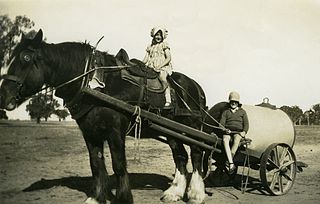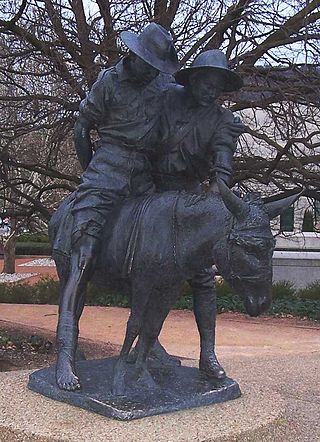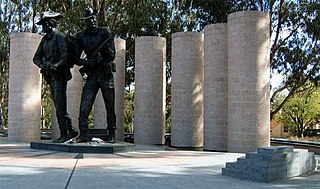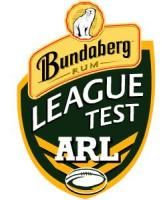
Anzac Day is a national day of remembrance in Australia and New Zealand that broadly commemorates all Australians and New Zealanders "who served and died in all wars, conflicts, and peacekeeping operations" and "the contribution and suffering of all those who have served". Observed on 25 April each year, Anzac Day was originally devised to honour the members of the Australian and New Zealand Army Corps (ANZAC) who served in the Gallipoli campaign, their first engagement in the First World War (1914–1918).

The culture of Australia is primarily a Western culture, originally derived from Britain but also influenced by the unique geography of Australia and the cultural input of Aboriginal, Torres Strait Islander and other Australian people. The British colonisation of Australia began in 1788, and waves of multi-ethnic migration followed. Evidence of a significant Anglo-Celtic heritage includes the predominance of the English language, the existence of a democratic system of government drawing upon the British traditions of Westminster government, parliamentarianism and constitutional monarchy, American constitutionalist and federalist traditions, and Christianity as the dominant religion.

A furphy is Australian slang for an erroneous or improbable story that is claimed to be factual. Furphies are supposedly heard from reputable sources, sometimes secondhand or thirdhand, and widely believed until discounted.

Digger is a military slang term for primarily infantry soldiers from Australia and New Zealand. Evidence of its use has been found in those countries as early as the 1850s, but its current usage in a military context did not become prominent until World War I, when Australian and New Zealand troops began using it on the Western Front around 1916–17. Evolving out of its usage during the war, the term has been linked to the concept of the Anzac legend, but within a wider social context, it is linked to the concept of "egalitarian mateship".

John Carroll, VC was an Australian recipient of the Victoria Cross, the highest award for gallantry in the face of the enemy awarded to British and Commonwealth forces.

The Anzac spirit or Anzac legend is a concept which suggests that Australian and New Zealand soldiers possess shared characteristics, specifically the qualities those soldiers allegedly exemplified on the battlefields of World War I. These perceived qualities include endurance, courage, ingenuity, good humour, larrikinism, and mateship. According to this concept, the soldiers are perceived to have been innocent and fit, stoical and laconic, irreverent in the face of authority, naturally egalitarian and disdainful of British class differences.

The Australian Army Memorial on Anzac Parade commemorates the service of Australian soldiers.

The Anzac Test is an annual rugby league football test match played between Australia and New Zealand for the Bill Kelly Memorial Trophy.
Humphrey Dennis McQueen is an Australian public intellectual. Over the course of his career he has written histories, biographies and cultural criticism. McQueen was the pivotal figure in the development of the Australian New Left. His most iconic work, A New Britannia, gained notoriety for challenging the dominant approach to Australian history developed by the Old Left. He has written books on history, the media, politics and the visual arts. Although McQueen began his career as an academic at the Australian National University under Manning Clark, most of his career has been as an independent scholar.
Russel Braddock Ward AM was an Australian historian best known for writing The Australian Legend (1958), an examination of the development of the "Australian character", which was awarded the Ernest Scott Prize.

Australiana is anything pertaining to Australian culture, society, geography and ecology, especially if it is endemic to Australia or has reached iconic status. It includes people, places, flora, fauna and events of Australian origins. Australiana objects can be highly collectable and comprise anything made in Australia or especially made for Australian use. Australiana often borrows from Australian Aboriginal culture, or the stereotypical Australian culture of the early 1900s.

The Anzac Day match is an annual Australian rules football match between Collingwood and Essendon, two clubs in the Australian Football League, held on Anzac Day at the Melbourne Cricket Ground (MCG).
The term "ocker" is used both as a noun and adjective for an Australian who speaks in Strine, a broad Australian accent, and acts in a rough and uncultivated manner. Richard Neville defined the ocker positively as being "about conviviality: comradeship with a touch of good-hearted sexism". However, the term is mostly understood to be pejorative compared to other terms, including larrikin, mate, cobber and bloke. In the 1980s, Carol Thatcher was said to have been met with a hostile reception when she attempted to write a book comparing "ockers" with "poms". John Richard wrote that the "awful ocker" juxtaposed with the "loveable larrikin".
Digger slang, also known as ANZAC slang or Australian military slang, is Australian English slang as employed by the various Australian armed forces throughout the 20th and 21st centuries. There have been four major sources of the slang: the First World War, the Second World War, the Korean War and the Vietnam War. The name Digger slang derives from the cultural stereotype of the Digger in the First World War. Graham Seal AM, Professor of Folklore at Curtin University of Technology, calls the slang Diggerese. It is a combination of an occupational jargon and an in-group argot.

Thinethavone "Tim" Soutphommasane is an Australian academic, social commentator and former public servant. He was Australia's Race Discrimination Commissioner at the Australian Human Rights Commission from 2013 to 2018. He has previously been a political staffer for Bob Carr, a columnist with The Age and The Australian newspapers, a lecturer at Sydney and Monash Universities, and a research fellow with the Per Capita think tank. He is a member of the board of the National Australia Day Council, and an ex officio member of the Council for Multicultural Australia.
There are approximately 12,000 Australians in Turkey. Of these, the overwhelming majority are in the capital Ankara, and the remainder are mostly in Istanbul. Australian expatriates in Turkey form one of the largest overseas Australian groups in Europe and Asia. The vast majority of Australian nationals in Turkey are Turkish Australians.
Bloke is a slang term for a common man in the United Kingdom, Ireland, Australia, New Zealand and South Africa.
Hall Barry Greenland, is an Australian political activist. He participated in the Freedom Rides. He studied history at the University of Sydney in the 1960s and was a president of the Labor Club in 1964. As an editor of Honi Soit in 1966 he was highly critical of the war in Vietnam. During the 1970s he wrote for Rolling Stone and The Digger. He served on Leichhardt Council and is the recipient of a Walkley Award. In 2013 he was the Australian Greens candidate for Grayndler.

Anzac Day is a day of remembrance in Queensland, Australia. It is a public holiday held on 25 April each year. The date is significant as the Australian and New Zealand troops first landed at Gallipoli in World War I on 25 April 1915.
The Sir John Monash Centre is a museum and interpretive centre that commemorates Australian servicemen and women who served on the Western Front during the First World War. The centre, located near the village of Villers-Bretonneux (Somme) in northern France, is set behind the Villers–Bretonneux Australian National Memorial and within the military cemetery. The centre opened in April 2018.












